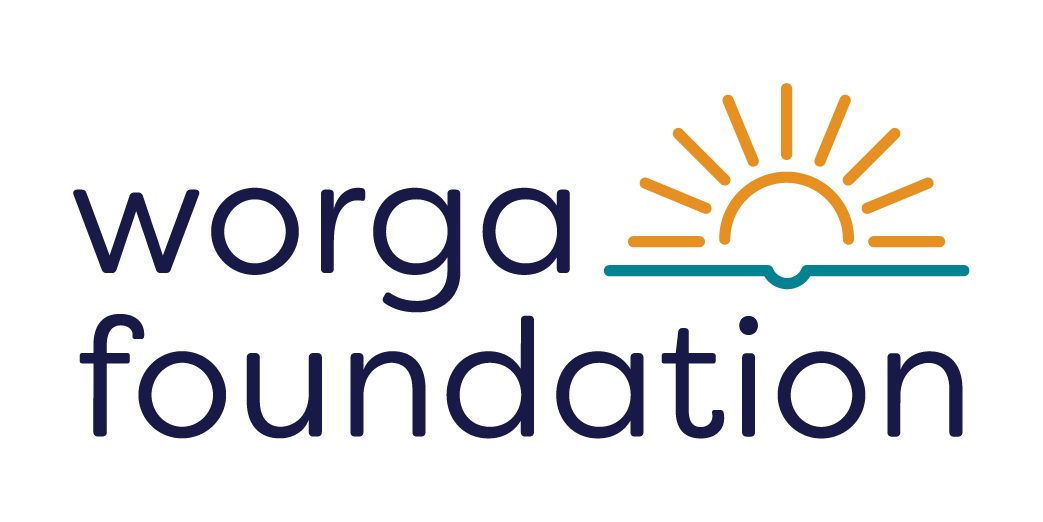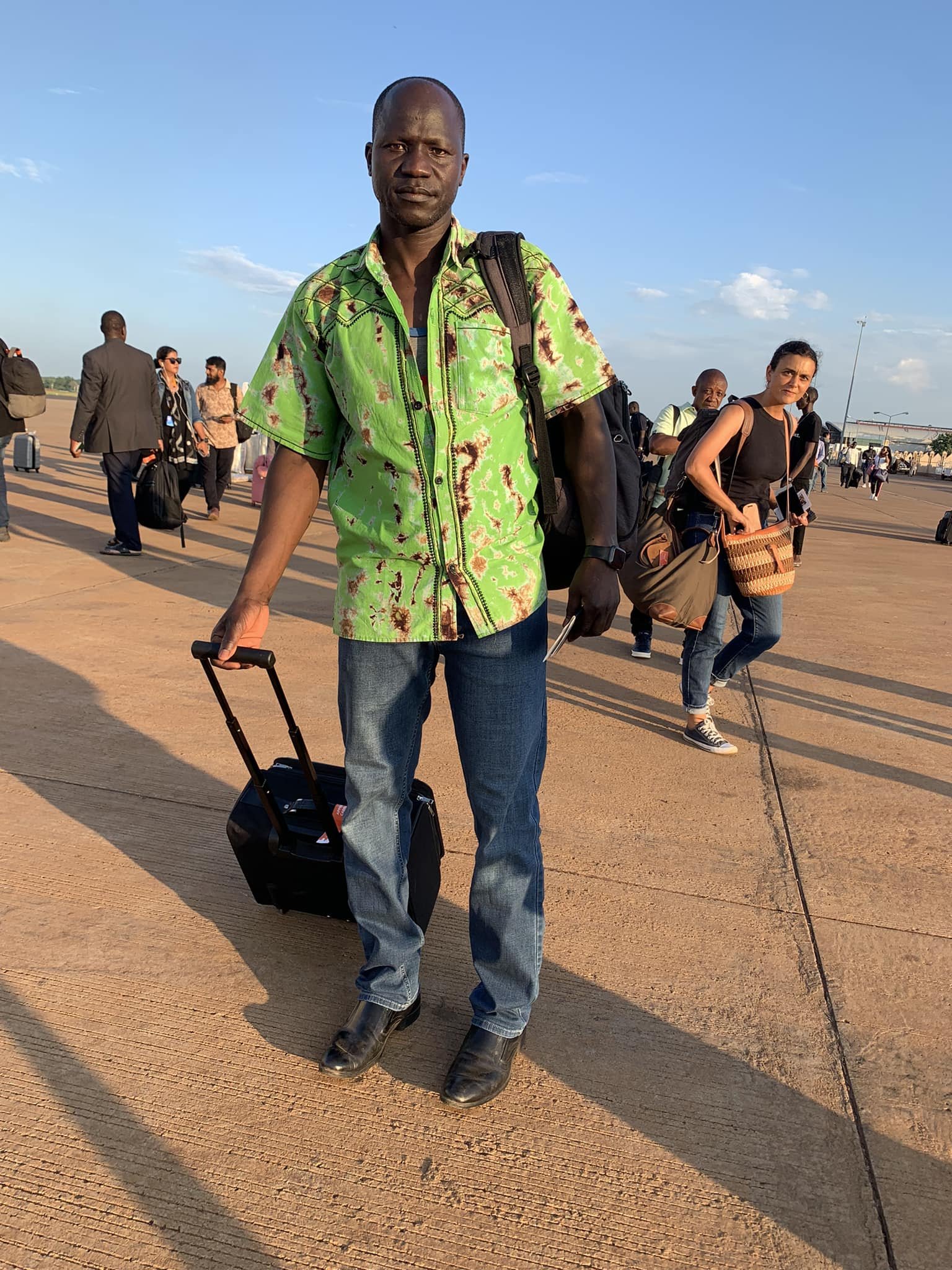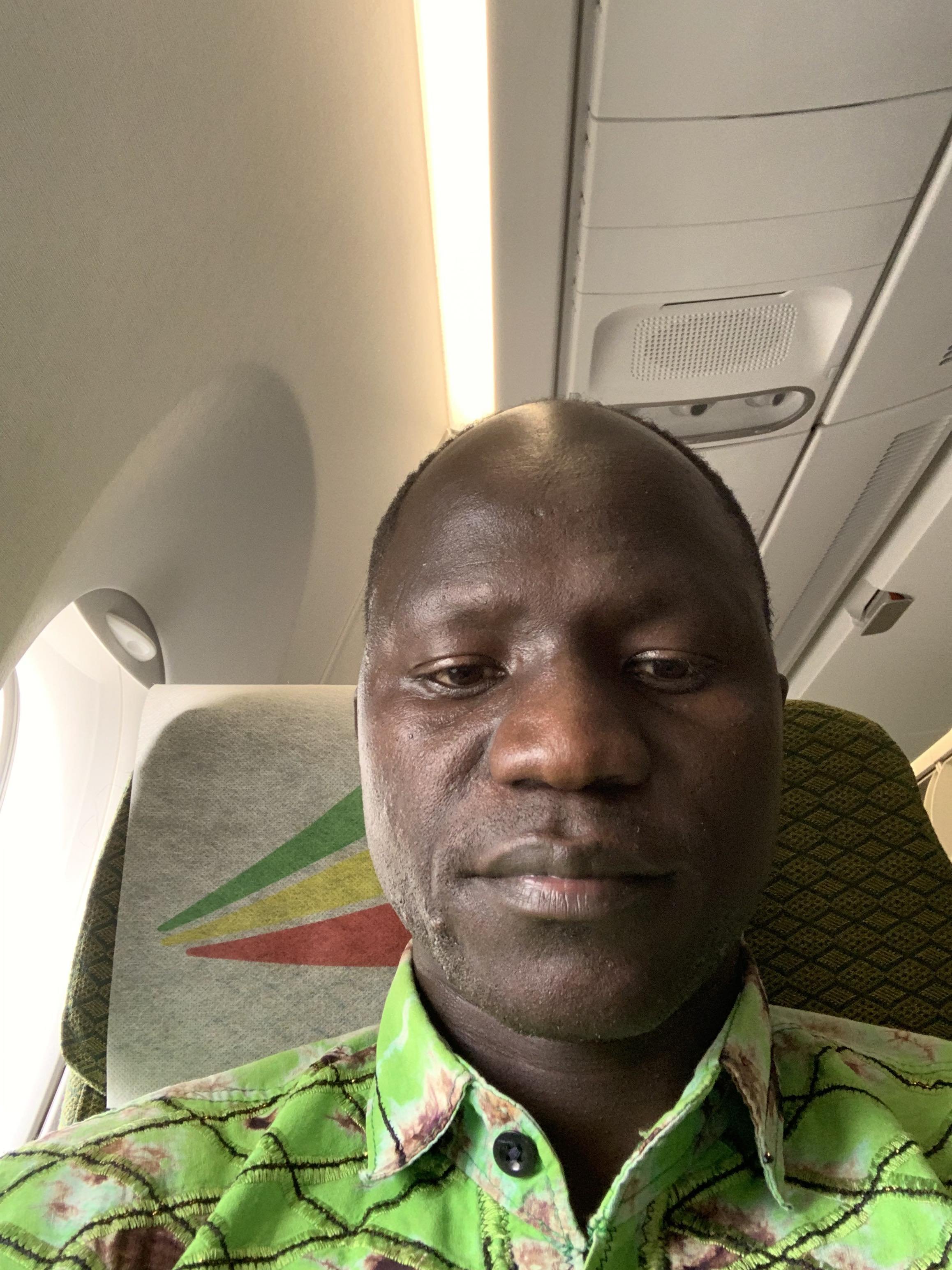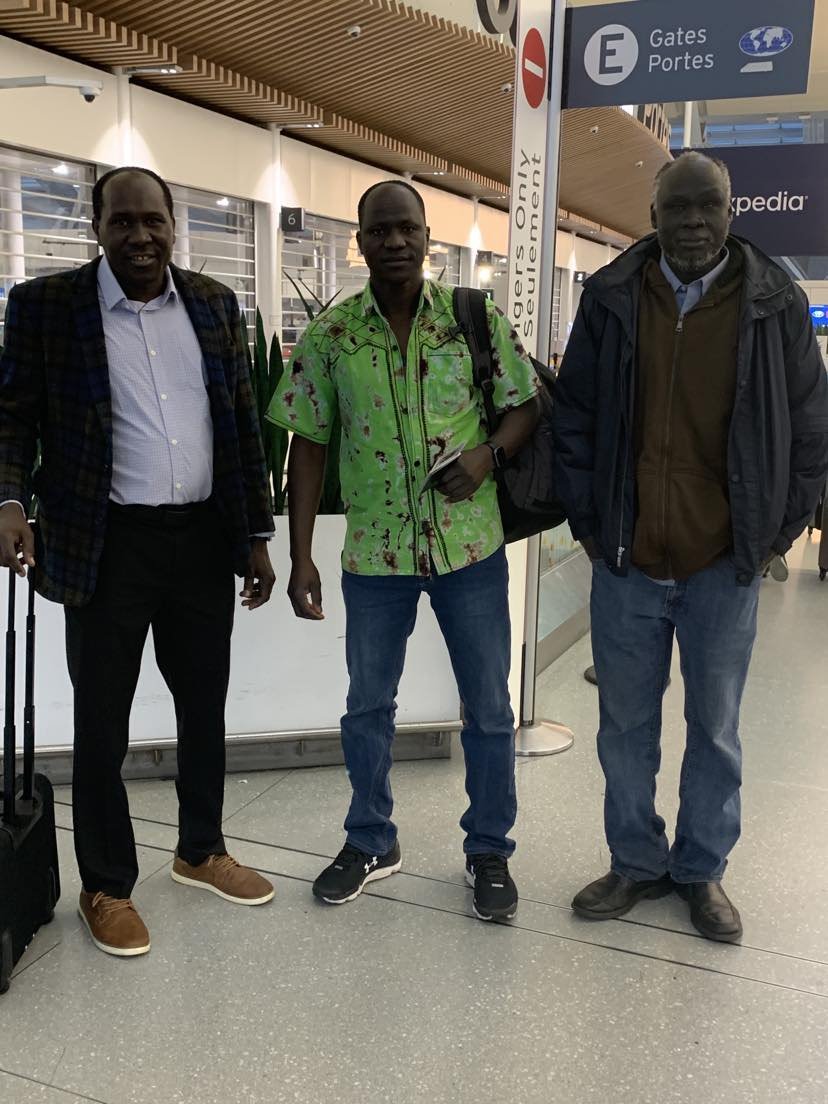The Worga Blog
Stories
Mission Accomplished
On November 12, 2023 Sila posted a photo of himself, on the airport tarmac wearing a patterned green shirt, back in Canada. Sila left Juba on November 9th after almost 3 weeks in South Sudan. Now, he’s back to his home in London, Ontario.
“My mission to South Sudan Juba was accomplished. Thank you to my friends and mentors for all your support and because [of] you the purpose my mission was successful. Now, I [have done] my part, would you do your part? I’m looking forward to future engagement. I’m doing good and I loved the place — South Sudan, Juba.”
Sila set out for Juba to bring the perspectives of Mabaan to the people making decisions about the country. Through years of steady relationship building he has gained access to leaders in South Sudan who don’t always get to hear the authentic voices of Mabaan living in Maban County. His work in Juba was about presenting a different perspective to those who have the ability to change the way that Maban County is managed. To share his views he set out to work with the political system, but also to challenge people in the system to listen differently than usual.
So, what does it mean to have accomplished his mission?
Based on what I’ve heard, it means that he stuck to the process: met with the people that he wanted to meet, listened as much as he spoke, learned as much as he taught, and shared his perspectives with confidence and humility.
It doesn’t mean that he changed the world in a few weeks, but he’s returning home proud of his actions.
He boarded his flight to Canada knowing that he was going to miss an important meeting that grew out of his work in Juba. The date of this meeting is yet to be determined, but if it goes ahead it has the potential to give Mabaan a chance to be heard in a new way. In a perfect world, Sila would have waited for this meeting to happen before returning home, but this time he accepted the limitations of his trip, and returned to Canada.
Last night Sila and I spoke for an hour, while he waited to pickup his oldest son from karate. I heard about the specifics of his meetings and about the possibilities for the future. I do my best to follow the implications of each story, but in truth I’m always thinking about my friend, wondering how he’s balancing his (at least) two worlds, and wishing for both worlds to understand what he’s doing. I asked him how reconciles the time away from his family in Canada with the work that he is called to do in South Sudan:
“We understand that it isn’t only about us, it’s about the broader community.”
Earlier this week he said something that builds on this broad view of the human family:
“Our work is not just about sustaining Mabaan; it is the sustainability of South Sudanese people.”
I hear what he’s saying and know that he sees the deep connections between all human people. I see them too, but that doesn’t entirely calm me down. I worry about what it could mean to see the world in such an interconnected way; to love others as you love those closest to you. It can be hard to explain the choices that you make when you see people outside of the nuclear family as your siblings, your family. The work that I do with Sila brings me face to face with the tension between love for what we might think of as “your own” and the real power of love for all.
Earlier in the week, Sila described the humility of his vision for what is possible if Mabaan are supported:
“The students we support were very excited as they learned about my arrival in South Sudan. One of them called me and told me that he is working outside of Maban County…Currently, two students we supported in Juba and Uganda are doing exams and without support these students would not have reached this stage.”
What I take from this reflection is that when we take care of Mabaan, they have as much ability as anyone else to do good in the broader community. This work isn’t about lifting Mabaan above others, it’s about recognizing that they too have the capacity to contribute to a stronger South Sudan.
There is much more to share about Sila’s trip to South Sudan and I’ll make sure to keep writing, but for now, I’m happy to write, “Sila made it back home, to one of his homes, safely.”
This article is written by Adam Fearnall, a member of the Worga Foundation Executive, executive coach, writer, and personal advisor to Sila Joshua.
Leave and Live
On Friday I wrote Doing Good, Love the Place in response to what I’d heard from Sila about his time in South Sudan. The gift of writing semi-regularly is that it acts as another small way for Sila and I to talk while he’s away. He sends me something, I write something, he gives me feedback on what I write, I write something new.
On Saturday, he shared more with me about what he meant when he said, “Doing Good, Love the Place.”
“I’m doing well and love the place because I feel their pain, their challenges, and I leave with them. Sometimes, I eat one meal despite [what] I have. If an individual is lucky then he can have a lunch or dinner and some of them none at all.”
Sila, on Saturday November 4, 2023
I’ve been sitting with Sila’s words for a few days and to be honest I wonder I’m getting it all. I’ll ask, when we have a longer conversation, but until then here is how I understand his words. My curiosity rests on the word “leave” as in, “I feel their pain, their challenges, and I leave with them.” The way that I’m reading this sentence is that Sila will “leave” with a real sense of the pain and challenges that Mabaan face in South Sudan. In other words, he’ll take their pain and challenges with him. I find support for this way of understanding in the next sentence, “Sometimes, I eat one meal despite [what] I have.” To me this speaks to Sila’s choice to eat only one meal a day because many of the people that he meets live this way.
However, I’m not sure that I’m reading it right. I wonder if Sila might mean “live” rather than “leave.”
In the end, does it really change the meaning of his words all that much?
The answer, likely, sits somewhere in the alchemy or mixing of leaving with and living with. To leave with something suggests a sense of carrying and holding. It isn’t hard for me to imagine Sila carrying and holding the pains and challenges of the people that he encounters. To live with something suggests an accompaniment, partnering, or collaboration. I can imagine this too; I see how Sila allows the experiences of others to accompany him as he walks through his life. The lives of others live with him — at work, play, and when he sips a cup of tea. He won’t always be with the people in South Sudan, but when he leaves the place, he will still live with all that they have shared with him. I’m going to suggest that we choose to read leave and live, rather than one or the other; in the combination we may find ourselves closer to the essence of Sila’s meaning.
Sila also shared a video of him playing football (soccer). Sila has told me about playing football for a team of players from Sherkole Refugee Camp before coming to Canada. He’s not here to fact check me, so I won’t give you all of the details, but I’ll suggest that his team wasn’t always a local favourite. You might be able to imagine what the response could be to a team of refugee players, playing outside the walls of the Camp. There’s also a group of boys in Maban County who play football. Sila played with them a few years ago, on his last trip to South Sudan. One day we’ll have to tell these stories, but for now we’ll just focus on the group in the video.
The first thing that I notice is that Sila is one of the only ones wearing shoes. He shared that he is “very lucky and privileged to have shoes” I also notice that he looks like he’s having fun. He doesn’t seem to be the best player on the field, but he doesn’t look like the worst one to me either! It seems to me like he’s having fun and that others are having fun watching him play. I like watching; it makes me smile.
And finally, to give you an idea of just how varied a day in Juba can be, here are a few more meeting photos.
This article is written by Adam Fearnall, a member of the Worga Foundation Executive, executive coach, writer, and personal advisor to Sila Joshua.
Doing Good, Love the Place
Sila arrived in Juba, South Sudan on October 22nd. He has been away for almost two weeks now.
Sila tells me that he’s “doing good and love[s] the place.” If it makes sense to you, let his words really sink in, “doing good and love the place.” I have very little sense of what it might feel like to be “on-the-ground” in South Sudan and my understanding of the country is framed by Western media narratives (except for where they have been interrupted by friends and colleagues like Sila). Sila’s message reminds me that Juba is a place where you can be “doing good” and “love the place.” Its a place where good and love exist; a place with meaning, worth appreciating.
When Sila left I assured him that I’d take a call whenever there was a need for us to speak; day or night. I didn’t really expect him to call me in the middle of the night because generally he seems to protect me from being awake at all hours, but I hope that he’ll never hesitate to pick up the phone if there’s something important to discuss.
In lieu of late-night phone calls, we text via Whatsapp and Facebook Messenger. I receive updates about his progress and see photos with the people that he is meeting. In his first dispatch, sent on Sunday, October 29th, Sila shared a day by day breakdown of his activities.
Here are some of the things that he has been working on:
Meetings and phone calls with Mabaan community, politicians, and government officials
Dinners and meals with Mabaan in the capital
Preparing and gathering documents
Meeting with the youth league
Attending church
Coordinating travel plans
Sila’s list of meetings includes many influential South Sudanese leaders, people that most Mabaan cannot regularly access. These meetings are, among other things, about strengthening communication between Mabaan and the leaders who make decision that effect their lives. It’s a tricky line to walk at times; engaging with Mabaan enough to understand what needs to be said to those in leadership, while not spending so much time with the leadership that you lose your connection with the grassroots. As you gain access to the circle of leadership, it becomes your responsibility to notice how your view of things differs from those who don’t have the access to decision-makers that you have. You have to locate yourself over and over because you end up both inside and outside of groups that others may seem to fit neatly within.
As I read his updates I’m aware of just how valuable it is for Sila to be, as we say, “on the ground” in Juba. For months, even years, he has been collecting information and listening; patiently waiting for the right people to be in the right places at the right times for a return to South Sudan to make sense. To my knowledge, he left with a rough idea of when he would have his meetings, but without guarantees that they would happen. That might seem like a leap of faith, and it is, but it also speaks to Sila’s approach. He knows what he wants to accomplish and recognizes that he can’t force things to happen on his timeline. He places trust in presence and an open schedule, and ends up with days that are full and meaningful.
When you let your life unfold in the present presence of presence I guess you can’t help but realize that you’re, “doing good and love the place.”
This article is written by Adam Fearnall, a member of the Worga Foundation Executive, executive coach, writer, and personal advisor to Sila Joshua.
Sila Returns To South Sudan
On Saturday, Sila Joshua (Worga’s Co-Founder) left from Toronto’s Pearson Airport to return to South Sudan for his second trip home since he left as a boy. He flew from Toronto to Addis Ababa (the capital of Ethiopia), and onwards to Juba, landing Sunday evening local time (the time in Juba is only 5 hours ahead me in Fredericton, NB and 6 ahead of those of you in London, ON).
While the purpose of his first trip was somewhat broader, the primary purpose of this trip is to meet with South Sudanese political leaders to bring forward perspectives about how to support the people of Maban County. The timing of his trip coincides with the availability of the leaders that he is hoping to meet.
While he is in South Sudan, I’ll be acting as one of his advisors and points of contact in North America. That means that we’ll be exchanging messages and getting on occasional video calls when network availability permits. It also means that I can relay messages to and from people who are curious about his work and his trip.
There are parts of me that wonder what possible use I can be as an advisor to Sila while he’s in South Sudan, but when I calm those feelings it makes a lot of sense. Sila and I have worked together for a decade and we’ve let our relationship grow through shared meals, language lessons, car rides, family visits, trick-or-treating, storytelling, and so much tea (and sugar). We dream up plans and projects — some of them even happen — and we share our hopes for each other and our communities. Sometimes we say that we feel “like family” and then pause to correct ourselves — “we are family.”
When Sila’s left for his first trip home to South Sudan, I was in Newfoundland with my partner Kelsey. While waiting in line at the Port-aux-Basque ferry terminal I spoke with Sila about his plans and the parts that he couldn’t plan until he got there. It all felt like something out of a movie: me on the edge of an island in the Atlantic and he on the way across multiple oceans to visit a place that I’d only ever imagined.
Some of you know the story: Sila returned home for the first time in 25 years and traveled between the capital of Juba and Maban County where he was born. He came back to Canada, after an extended stay, on Christmas Eve. The trip seemed momentous to me. The thought of another trip wasn’t exactly at the top of my mind; I was still basking in the glow of the first one.
It was different for Sila. While the urgency of a second trip drifted down my priority list, almost no time passed before Sila started to imagine what needed to be done when he returned. I wondered how he was going to make it work.
In the intervening years, I’ve watched him invest considerable time and energy into relationships with people in Maban County and South Sudan and with supporters around the world. His work with the Worga Foundation is only part of it. Hardly a day goes by where he isn’t interacting with someone about resolving a conflict, exploring an idea, pursuing a goal, or building a future. This all happens alongside his roles as dad, nonprofit employee, second job worker, and many others. If I’m being honest, I alternate between pride at what I see him doing and frustration that we haven’t been able to make it easier for him to do everything that he does.
I intend to share some of my insights about his time in South Sudan on this blog because I want to be part of documenting the contributions that Mabaan, like Sila, are making to communities around the world. There are limits to my abilities as an observer; I can only show what I’m able to see. There are things that I’ll miss and things that only Sila can communicate, but there’s something valuable in my view and my experience.
The last time that Sila was away we spoke whenever the network allowed us to connect. I remember the background of his hotel in Juba; our efforts to speak more generally than we might otherwise; the mosquito nets at his accommodations in Maban County; the dreams that came to him during his sleep; and the stories about the people he met in markets, on streets, and at tea stands.
I won’t be able to tell you what Sila is seeing, but I’ll do my best to share something of my experience of his time in South Sudan
This article is written by Adam Fearnall, a member of the Worga Foundation Executive, executive coach, writer, and personal advisor to Sila Joshua.









